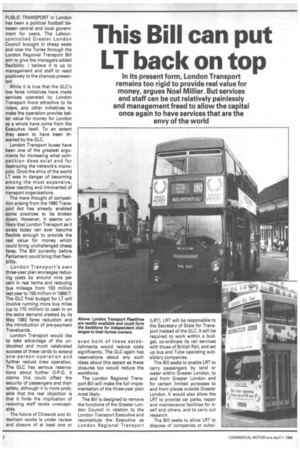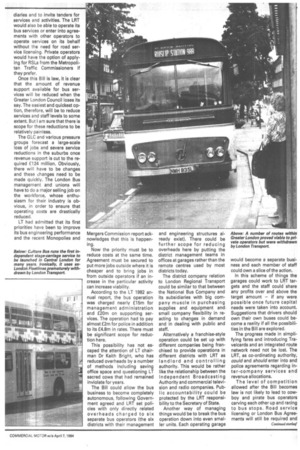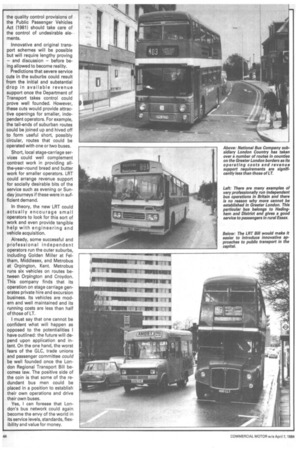This Bill can put IT back on top
Page 44

Page 45

Page 46

If you've noticed an error in this article please click here to report it so we can fix it.
PUBLIC TRANSPORT in London has been a political football between central and local government for years. The Labourcontrolled Greater London Council brought in cheap seats and now the Tories through the London Regional Transport Bill aim to give the managers added flexibility. I believe it is up to management and staff to react positively to the chances presented.
While it is true that the GLC's low fares initiatives have made services operated by London Transport more attractive to its riders, any other initiatives to make the operation provide better value for money for London as a whole have come from the Executive itself. To an extent they seem to have been thwarted by the GLC.
London Transport buses have been one of the greatest arguments for increasing what competition does exist and for destroying the network's monopoly. Once the envy of the world LT was in danger of becoming among the most expensive, slow reacting and introverted of transport organisations.
The mere thought of competition arising from the 1980 Transport Act has already enabled some practices to be broken down. However, it seems unlikely that London Transport as it exists today can ever become flexible enough to provide the real value for money which could bring unchallenged cheap fares. The Bill currently before Parliament could bring that flexibility.
London Transport's own three-year plan envisages reducing costs by around nine per cent in real terms and reducing bus mileage from 163 million last year to 156 million in 1986/7. The GLC final budget for LT will involve running more bus miles (up to 170 million) to cash in on the extra demand created by its May 1983 fares reduction and the introduction of pre-payment Travelcards.
London Transport would like to take advantage of the undoubted and much celebrated success of these cards to extend one-person-operation and further reduce crew operation. The GLC has serious reservations about further O-P-O. It claims this could offset the security of passengers and their safety, although it is more probable that the real objection is that it finds the implication of reducing staff levels unacceptable.
The future of Chiswick and Aldenham works is under review and closure of at least one or even both of these establishments would reduce costs significantly. The GLC again has reservations about any such ideas about this aspect as these closures too would reduce the we The London Regional Transport Bill will make the full implementation of the three-year plan most likely.
The Bill is designed to remove the functions of the Greater London Council in relation to the London Transport Executive and reconstitute the Executive as London Regional Transport (LRT), LRT will be responsible to the Secretary of State for Transport instead of the GLC. It will be required to work within a budget, co-ordinate its rail services with those of British Rail, and set up bus and Tube operating subsidiary companies.
The Bill seeks to enable LRT to carry passengers by land or water within Greater London, to and from Greater London and for certain limited purposes to and from places outside Greater London. It would also allow the LAT to provide car parks, repair and maintenance facilities for itself and others, and to carry out research.
The Bill seeks to allow LRT to dispose of companies or subsi diaries and to invite tenders for services and activities. The LRT would also be able to operate its bus services or enter into agreements with other operators to operate services on its behalf without the need for road service licensing. Private operators would have the option of applying for RSLs from the Metropolitan Traffic Commissioners if they prefer.
Once this Bill is law, it is clear that the amount of revenue support available for bus services will be reduced when the Greater London Council loses its say. The easiest and quickest option, therefore, will be to reduce services and staff levels to some extent. But I am sure that there is scope for these reductions to be relatively painless.
The GLC and various pressure groups forecast a large-scale loss of jobs and severe service reductions in the suburbs once revenue support is cut to the required £124 million. Obviously, there will have to be changes and these changes need to be made quickly. The London Bus management and unions will have to do a major selling job on the workforce, whose enthusiasm for their industry is obvious, in order to ensure that operating costs are drastically reduced.
LT had admitted that its first priorities have been to improve its bus engineering performance and the recent Monopolies and Mergers Commission report acknowledges that this is happening.
Now the priority must be to reduce costs at the same time. Agreement must be secured to put more jobs outside where it is cheaper and to bring jobs in from outside operators if an increase in the particular activity can increase viability.
According to the LT 1982 annual report, the bus operation was charged nearly f15m for management administration and 120m on supporting services. The operation had to pay almost Um for police in addition to its Mkt.] in rates. There must be significant scope for reduction here.
This possibility has not escaped the attention of LT chairman Dr Keith Bright, who has reduced overheads by a number of methods including saving office space and questioning LT sacred cows that had remained inviolate for years.
The Bill could allow the bus business to become completely autonomous, following Government agreed and LRT set policies with only directly related overheads charged to six separate bus operators (the six districts with their management and engineering structures already exist). There could be further scope for reducing overheads here by putting the district management teams in offices at garages rather than the remote centres used by most districts today.
The district company relation to London Regional Transport could be similar to that between the National Bus Company and its subsidiaries with big company muscle in purchasing supplies and equipment and small company flexibility in reacting to changes in demand and in dealing with public and staff.
Alternatively a franchise-style operation could be set up with different companies being franchised to provide operations in different districts with LRT as landlord and controlling authority. This would be rather like the relationship between the Independent Broadcasting Authority and commercial television and radio companies. Public accountability could be protected by the LAT responsibility to the Secretary of State.
Another way of managing things would be to break the bus operation down into even smaller units. Each operating garage would become a separate business and each member of staff could own a slice of the action.
In this scheme of things the garages could work to LRT targets and the staff could share any profits over and above the target amount — if any were possible once future capital needs were taken into account. Suggestions that drivers should own their own buses could become a reality if all the possibilities in the Bill are explored.
The progress made in simplifying fares and introducing Travelcards and an integrated route network need not be lost. The LAT, as co-ordinating authority, could and should enter into and police agreements regarding inter-company services and revenue allocations.
The level of competition allowed after the Bill becomes law is not likely to lead to cowboy and pirate bus operators carving each other up and racing to bus stops. Road service licensing or London Bus Agreements will still be required and the quality control provisions of the Public Passenger Vehicles Act (1981) should take care of the control of undesirable elements.
Innovative and original transport schemes will be possible but will require lengthy proving — and discussion — before being allowed to become reality.
Predictions that severe service cuts in the suburbs could result from the initial and substantial drop in available revenue support once the Department of Transport takes control could prove well founded. However, these cuts would provide attractive openings for smaller, independent operators. For example, the tail-ends of suburban routes could be joined up and hived off to form useful short, possibly circular, routes that could be operated with one or two buses.
Short, local stage-carriage services could well complement contract work in providing allthe-year-round bread and butter work for smaller operators. LRT could arrange revenue support for socially desirable bits of the service such as evening or Sunday journeys if these were in sufficient demand.
In theory, the new LRT could actually encourage small operators to look for this sort of work and even provide tangible help with engineering and vehicle acquisition.
Already, some successful and professional independent operators run the outer suburbs, including Golden Miller at Feltham, Middlesex, and Metrobus at Orpington, Kent. Metrobus runs six vehicles on routes between Orpington and Croydon. This company finds that its operation on stage carriage generates private hire and excursion business. Its vehicles are modern and well maintained and its running costs are less than half of those of LT.
I must say that one cannot be confident what will happen as opposed to the potentialities I have outlined: the future will depend upon application and intent. On the one hand, the worst fears of the GLC, trade unions and passenger committee could be well founded once the London Regional Transport Bill becomes law. The positive side of the coin is that some of the redundant bus men could be placed in a position to establish their own operations and drive their own buses.
Yes, I can foresee that London's bus network could again become the envy of the world in its service levels, standards, flexibility and value for money.




































































































